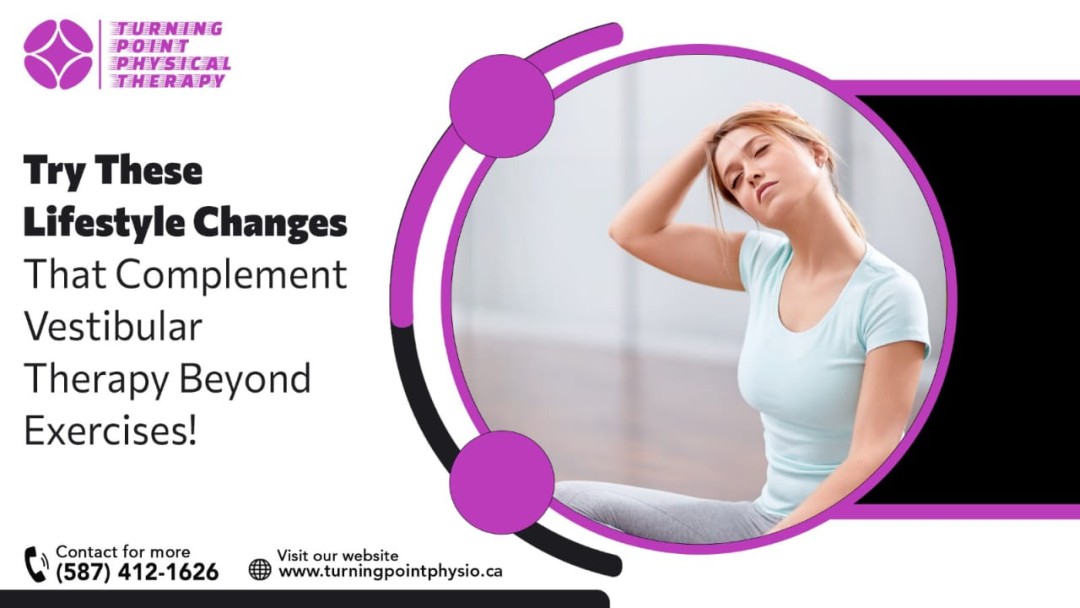
Managing dizziness, imbalance, and vertigo requires more than just clinic-based interventions. While targeted exercises remain a core component of vestibular therapy, adopting supportive daily habits for balance can significantly enhance outcomes.
In the approach to vestibular physiotherapy in Edmonton, incorporating simple yet consistent lifestyle adjustments helps promote long-term vestibular health and improve functional stability. These changes complement clinical care by supporting the body's natural mechanisms for equilibrium and reducing symptom recurrence.
Improving Posture To Enhance Head And Neck Alignment
Maintaining an upright posture with the ears aligned over the shoulders reduces strain on the neck muscles and the vestibular system. Poor posture often worsens dizziness and imbalance. Small changes such as adjusting desk height, using supportive chairs, and being mindful of head position throughout daily activities help maintain spinal and vestibular alignment. These postural habits enhance the effectiveness of vestibular physiotherapy in Edmonton and minimize recurring discomfort.
Establishing Consistent Daily Habits For Balance
Daily routines that avoid sudden head turns or abrupt position changes contribute to balance improvement. Rising slowly from bed, taking steady steps when walking, and avoiding cluttered walkways reduces unexpected vestibular disturbances. Repetition of these habits throughout the day helps the body gradually adapt to changes in position and movement, offering a smoother balance experience between formal therapy sessions.
Prioritizing Sleep Quality For Nervous System Recovery
Restorative sleep allows the brain and inner ear systems to recalibrate. Irregular sleep patterns or sleep quality can intensify dizziness and disorientation. Establishing consistent bedtimes, limiting caffeine or electronic device use in the evening, and creating a calming bedtime routine contribute to better sleep. Consistent rest improves the body's ability to respond to balance cues and supports progress made during vestibular therapy.
Choosing Hydration And Nutrition To Stabilize Vestibular Health
Inner ear function depends on stable fluid levels. Dehydration or excessive sodium intake can disrupt this delicate balance. Drinking sufficient water throughout the day, avoiding excessive salt, limiting caffeine, and maintaining a balanced diet rich in fruits and vegetables helps regulate inner ear pressure. These dietary choices support the work of balance retraining and help reduce symptom severity.
Managing Stress To Reduce Vestibular Symptom Flare-Ups
Stress and anxiety can heighten dizziness and balance issues. Stress reduction techniques: deep diaphragmatic breathing, meditation and progressive muscle relaxation can promote calmness and reduce symptom flare-ups. Practicing these regularly provides additional stability and allows for better coping with vestibular challenges outside of structured therapy.
Creating Safe Home Environments For Balance Reinforcement
A home environment free of hazards enhances stability and prevents falls. Placing non-slip mats in bathrooms, installing grab bars along stairs or near beds, keeping walkways clear, and ensuring good lighting all minimize tripping risks. These safety measures create a supportive setting for individuals to practice safe movement and maintain the progress achieved in vestibular physiotherapy in Edmonton.
Engaging In Safe Movement Practices Beyond Therapy
Daily movement activities can extend the benefits of formal vestibular exercises. Simple routines like walking along a straight line, practicing gentle head rotations, or performing single-leg stands while near a stable surface provide safe, low-impact stimulation for the vestibular system. These controlled activities encourage continued balance improvements outside of clinic visits.
Reducing Screen Time To Minimize Visual Stimulation
Extended exposure to screens can overwhelm the visual-vestibular connection, worsening symptoms of dizziness or nausea. Limiting continuous screen time, taking regular visual breaks, adjusting screen brightness, and maintaining proper viewing distances can ease visual strain. Reducing visual stress helps stabilize the vestibular system and supports therapy outcomes.
Using Mindfulness For Motion Tolerance Improvement
Mindful awareness during walking, sitting, standing, or turning promotes smoother movements and reduces imbalance. Practicing mindful walking, focusing on steady breathing, and moving intentionally allows the brain to better process vestibular input. This conscious control supports the neuromuscular retraining goals of vestibular physiotherapy in Edmonton.
Scheduling Regular Check-Ins For Progress Monitoring
Consistent communication with healthcare providers ensures that any adjustments needed in home routines or exercise plans are addressed promptly. These check-ins help track improvements, modify strategies when necessary, and maintain long-term success in managing vestibular health by combining lifestyle changes and balance retraining.
Incorporating Gentle Stretching To Promote Flexibility
Gentle full-body stretching reduces muscle tightness and supports better posture and movement control. Stretching routines focusing on the neck, shoulders, hips, and calves improve body awareness and enhance balance reactions. Practicing slow, controlled stretches throughout the day complements the stability gained through balance retraining and minimizes muscle stiffness that could worsen imbalance.
Avoiding Rapid Changes In Head Position
Quick movements can trigger dizziness and disrupt the body’s balance system. Adopting deliberate, slow head turns and avoiding sudden head tilts during daily activities reduces the risk of symptom flare-ups. This habit offers valuable support to the structured exercises taught during vestibular therapy, helping individuals maintain equilibrium throughout their daily routines.
Wearing Proper Footwear Improves Stability
Supportive, well-fitting shoes with non-slip soles provide essential stability for safe walking. Avoiding high heels or loose-fitting footwear reduces the risk of falls and promotes steady foot positioning. Choosing proper footwear complements the goals of vestibular physiotherapy in Edmonton by reinforcing balance strategies and ensuring safer movement on varied surfaces.
Bringing Lifestyle and Therapy Together for Lasting Balance
Sustainable improvements in balance and stability rely on combining targeted exercises with healthy lifestyle choices. Small daily adjustments such as mindful posture, regular hydration, stress management, and at-home movement practices enhance the body’s ability to maintain equilibrium. For those seeking support through vestibular physiotherapy in Edmonton, treatment at Turning Point Physiotherapy is designed to work alongside these lifestyle practices for more consistent results. Begin building a routine that blends therapy and lifestyle for a more stable and confident daily life.
Media Contact
Company Name: Emerald Hills Physio
Email: Send Email
Phone: +15878554831
Country: Canada
Website: https://emeraldhillsphysio.com/





